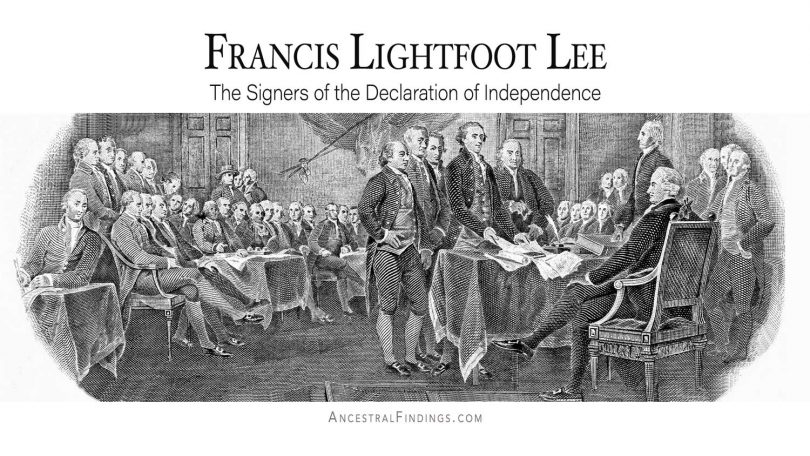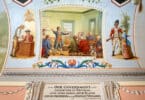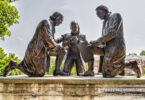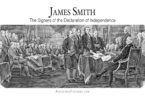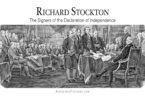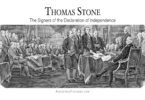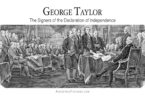Francis Lightfoot Lee was born in October of 1734 at his family’s home in Hague, Westmoreland County, Virginia. The name of his family’s home was Machadoc, and was later renamed to Burnt House Field. Francis was the fourth son of Thomas Lee and Hannah Harrison Ludwell. His father grew up on the same estate on which Francis was born, and his mother grew up at the nearby Greenspring Plantation.
The Lee family was one of the First Families of Virginia, with a history in the colony going all the way back to the first English settlers there. Francis’s father was President of the King’s Council in Virginia for several years, so was prominent in the local community and in the colony. He educated all of his sons exceptionally well, and all of whom became public servants in some way. One of those sons, Francis’s brother, Richard Henry Lee, became famous for his passionate support of the Declaration of Independence at the Second Continental Congress. In fact, Francis and Richard Lee, brothers, both became signers of the Declaration of Independence.
Francis was tutored at home by a highly respected man, under whose instruction Francis’s love of learning, especially reading and research, became powerful guiding passions of his life. He was also well-versed in several branches of science, and in literature.
Unlike a lot of other signers of the Declaration of Independence, Francis did not have a career. The substantial fortune left to him by his father made a career unnecessary, and Francis became a true man of leisure. He loved his home, his wife, his friends, and being social, as well as spending time indulging his intellectual pursuits.
In 1772, Francis married Rebecca Plater Tayloe, his second cousin one time removed. They had no children together, which Francis took no noticeable sadness in, and used the time he would have devoted to raising and paying attention to children to putting toward his personal interests.
Despite being a lover of leisure and enjoying being at home and with his friends, Francis was also of the patriot spirit, like his brothers. He was also of a mind that public service was important, having been brought up by a father who was involved in it. In 1765, he was a member of the House of Burgesses from Loudon County, where his estate was located. The other members of the House viewed Francis as a man with a lot of good sense and excellent judgement. Because of his good reputation in this office, he was elected to it annually until 1772. That was the year he got married, and, as his wife was from Richmond County, Francis moved there. Once in Richmond County, he was soon selected to serve on the House of Burgesses from there.
In 1774, Francis was one of a group of men who were asked to be on a general colonial congress, and on the first of what were to be the Virginia Conventions. He duly went to both groups and performed well at them. He was asked to be a delegate to the First Continental Congress in Philadelphia, and stayed on for the Second Continental Congress. In fact, he served on the Continental Congresses until 1779, and, along with his brother and fellow delegate Richard Lee, became a signer of the Declaration of Independence. He also signed the Articles of Confederation while serving on the Congress.
While serving on the Continental Congresses, Francis was noted for seldom taking part in any of the public discussions they had there. However, his enthusiasm for liberty from Great Britain was never denied by anyone, as it was obvious to those who knew him. While his brother Richard is more famous to history because he was the one chosen to formally bring up the question of independence to the Congress, Francis’s service on the Congress and signing of the Declaration of Independence was of no less historical importance than what Richard did. It is just not as well known.
Once he left the Continental Congress, Francis went back home to Virginia, and served on the Virginia State Senate from 1778 to 1782. The pleasures of his hobbies and interests at his home soon called to him, though, and he retired from public life after leaving the Virginia State Senate, having played a part in both the colonial government and the new United States government in Virginia.
In January of 1797, both Francis and his wife came down with pleurisy at their home, called Menokin, in Richmond County, Virginia. Francis died from it on January 11, 1797, his wife having crossed to the other side from it four days prior to Francis. They were buried together in the Tayloe family cemetery (his wife’s family) at the Mount Airy Plantation, close to Warsaw, Virginia.
Francis was elected to the American Philosophical Society in 1768. The WWII Liberty Ship SS Francis L. Lee was named after him.
As previously mentioned, Francis’s family was one of the First Families of Virginia. As such, he had some illustrious ancestors and collateral line descendants through his siblings. He was the grandson of Colonel Richard Lee II, a great-grandson of Colonel Richard Lee I, brother of Senator Richard Henry Lee, and brother of US diplomats William and Dr. Arthur Lee. His other brother, Thomas Ludwell Lee, was on a committee with Thomas Jefferson to re-write the laws of Virginia after the American Revolution. His brother Richard Henry Lee named one of his sons Francis Lightfoot Lee II, after Francis. Other men who shared Francis’s name descended from this namesake nephew.
While he may not have been the most well-known of the signers of the Declaration of Independence, Francis Lightfoot Lee was nonetheless an important part of the American cause of independence, and did his part in helping the colonies to achieve it. He is part of the reason the colonies became the United States of America.

